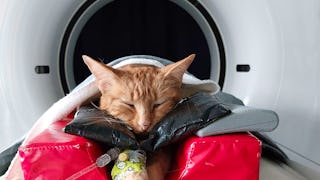- Browse
- Veterinary
Veterinary Courses
Veterinary courses can help you learn animal anatomy, physiology, diagnostics, and treatment protocols. You can build skills in surgical techniques, anesthesia management, and client communication. Many courses introduce tools like diagnostic imaging equipment, laboratory analysis software, and electronic health records, that support effective veterinary practice and patient care.
Popular Veterinary Courses and Certifications
 T
TThe University of Edinburgh
Skills you'll gain: Anatomy, Vital Signs, Cardiology, Basic Patient Care, Physiology, Patient Observation, Biology, Clinical Assessment, Patient Communication
4.8·Rating, 4.8 out of 5 stars2.5K reviewsMixed · Course · 1 - 3 Months
 T
TThe University of Edinburgh
Skills you'll gain: Applied Behavior Analysis, Scientific Methods, Safety Assurance, Behavior Management, Stress Management, Empathy & Emotional Intelligence, Ethical Standards And Conduct, Healthcare Ethics, General Science and Research, Environmental Issue, Nutrition and Diet
4.8·Rating, 4.8 out of 5 stars5.4K reviewsMixed · Course · 1 - 3 Months
 Status: PreviewPreviewT
Status: PreviewPreviewTThe University of Edinburgh
Skills you'll gain: Anesthesiology, Post-Anesthesia Care Unit, Pre-Anesthetic Assessment, Pain Management, Patient Education And Counseling, Stress Management, Preventative Care, Perioperative Care, Operating Room (OR), Clinical Practices, Patient Positioning, Clinical Nutrition, Behavioral Health, Patient Observation, Behavior Management, Long Term Care
5·Rating, 5 out of 5 stars40 reviewsIntermediate · Course · 1 - 4 Weeks
 Status: PreviewPreviewU
Status: PreviewPreviewUUniversitat Autònoma de Barcelona
Skills you'll gain: Laboratory Testing, Laboratory Techniques, Diagnostic Tests, Endocrinology, Clinical Laboratory Science, Biochemistry, Nephrology, Specimen Collection, Urinalysis, Specimen Preparation, Physiology, Arterial Blood Gas Analysis
4.9·Rating, 4.9 out of 5 stars34 reviewsIntermediate · Course · 1 - 3 Months
 Status: PreviewPreviewU
Status: PreviewPreviewUUniversity of Florida
Skills you'll gain: Nutrition and Diet, Preventative Care, Care Management, Behavior Management, Anatomy, Vital Signs, Physiology, Infectious Diseases, Pharmacology, First Aid, Psychology
4.9·Rating, 4.9 out of 5 stars990 reviewsMixed · Course · 1 - 3 Months
 T
TThe University of Edinburgh
Skills you'll gain: Applied Behavior Analysis, Behavior Management, Cultural Diversity, General Science and Research, Scientific Methods, Caregiving, Non-Verbal Communication, Ethical Standards And Conduct, Research, Biology
4.8·Rating, 4.8 out of 5 stars2.4K reviewsMixed · Course · 1 - 3 Months
What brings you to Coursera today?
 Status: Free TrialFree TrialR
Status: Free TrialFree TrialRRice University
Skills you'll gain: Medical Terminology, Medical History Documentation, Pulmonology, Cardiology, Electronic Medical Record System, Medical Records, Endocrinology, Human Musculoskeletal System, Orthopedics, Obstetrics And Gynecology, Neurology, Gynecology, Urology, Hematology, Anatomy, Immunology, Diagnostic Tests, Patient Treatment, Physiology, Communication
4.9·Rating, 4.9 out of 5 stars993 reviewsBeginner · Specialization · 3 - 6 Months
 Status: NewNewStatus: Free TrialFree TrialU
Status: NewNewStatus: Free TrialFree TrialUUniversity of Illinois Urbana-Champaign
Skills you'll gain: Nutritional Assessment, Predictive Analytics, Maternal Health, Machine Learning, Diagnostic Tests, Food and Beverage, Health Systems, Operating Cost, Nutrition and Diet, Market Dynamics, Water Resources, Food Safety and Sanitation, Manufacturing and Production, Behavioral Economics, Business Economics, Environment, Molecular Biology, Production Management, Consumer Behaviour, Molecular, Cellular, and Microbiology
5·Rating, 5 out of 5 stars32 reviewsIntermediate · Specialization · 3 - 6 Months
 Status: Free TrialFree TrialU
Status: Free TrialFree TrialUUniversity of California San Diego
Skills you'll gain: Drug Development, Clinical Trials, Pharmaceuticals, Clinical Research, Commercialization, Pre-Clinical Development, Good Clinical Practices (GCP), Pharmacotherapy, Pharmacology, Regulatory Affairs, Intellectual Property, Sales Strategy, Biotechnology, Portfolio Management, Bioinformatics, Precision Medicine, Strategic Partnership, Regulatory Compliance, Marketing, Marketing Strategies
4.6·Rating, 4.6 out of 5 stars6.5K reviewsBeginner · Specialization · 3 - 6 Months
 Status: NewNewStatus: Free TrialFree Trial
Status: NewNewStatus: Free TrialFree TrialSkills you'll gain: Patient Registration, Medical Records, Medical Billing and Coding, Medical Office Procedures, Health Insurance Portability And Accountability Act (HIPAA) Compliance, Patient Communication, Health Information Management, Revenue Cycle Management, Electronic Medical Record, Records Management, Clinical Documentation, Patient Safety, Care Coordination, Data Entry, Scheduling, Inventory Management System, Medical Terminology, Regulatory Compliance, Key Performance Indicators (KPIs), Quality Assurance
4.3·Rating, 4.3 out of 5 stars7 reviewsBeginner · Specialization · 3 - 6 Months
 Status: Free TrialFree TrialU
Status: Free TrialFree TrialUUniversity of Colorado Boulder
Skills you'll gain: Social Studies, Social Sciences, Sociology, Anthropology, Culture, Laboratory Research, Behavioral Health, Healthcare Ethics, Research, Media and Communications, Empathy & Emotional Intelligence, Ethical Standards And Conduct, Health Care, Cultural Diversity, Mental and Behavioral Health, Food and Beverage, Rehabilitation, Biology, Nutrition and Diet, Sports Medicine
4.7·Rating, 4.7 out of 5 stars210 reviewsBeginner · Specialization · 1 - 3 Months
 Status: NewNewStatus: Free TrialFree TrialM
Status: NewNewStatus: Free TrialFree TrialMMedCerts
Skills you'll gain: Positive Behavior Support, Speech Therapy, Behavior Management, Autism Spectrum Disorders, Education and Training, Communication Strategies, Social Skills, Interpersonal Communications, Mental and Behavioral Health, Teaching, Communication, Learning Theory, Child Development, Classroom Management, Training Programs, Instructional Strategies, Developmental Disabilities, Proactivity, Data Collection, Learning Strategies
4.9·Rating, 4.9 out of 5 stars15 reviewsBeginner · Specialization · 1 - 3 Months
In summary, here are 10 of our most popular veterinary courses
- EDIVET: Do you have what it takes to be a veterinarian?: The University of Edinburgh
- Animal Behaviour and Welfare: The University of Edinburgh
- Animal Welfare in the Clinic: The University of Edinburgh
- Bioquímica clínica en Veterinaria: Universitat Autònoma de Barcelona
- The Horse Course: Introduction to Basic Care and Management: University of Florida
- The Truth About Cats and Dogs: The University of Edinburgh
- Medical Terminology: Rice University
- Dairy Nutrition for Udder Success: University of Illinois Urbana-Champaign
- Drug Development Product Management: University of California San Diego
- Optimizing the Clinic: Basics of Medical Office Management: Coursera
Frequently Asked Questions about Veterinary
Veterinary science is the branch of medicine that focuses on the health and well-being of animals. It plays a crucial role in ensuring the health of pets, livestock, and wildlife, which in turn supports public health and food safety. By diagnosing and treating illnesses, performing surgeries, and providing preventive care, veterinary professionals help maintain the balance of ecosystems and contribute to the overall health of communities.
A variety of career paths are available in the veterinary field. Common roles include veterinarian, veterinary technician, veterinary assistant, and animal care specialist. Additionally, there are opportunities in research, wildlife conservation, and public health. Each of these positions plays a vital role in animal care and welfare, offering diverse experiences and responsibilities.
To succeed in veterinary roles, several key skills are essential. These include strong communication skills for interacting with pet owners and colleagues, critical thinking for diagnosing and treating animals, and empathy to provide compassionate care. Additionally, technical skills related to animal handling and medical procedures are crucial, along with a solid foundation in biology and anatomy.
There are many online veterinary courses available that cater to different interests and career goals. Some popular options include introductory courses in animal care, Animal Welfare in the Clinic, veterinary technology, and specialized topics like animal behavior or emergency care. Exploring platforms like Coursera can help you find courses that fit your needs and schedule.
Yes. You can start learning veterinary science on Coursera for free in two ways:
- Preview the first module of many veterinary courses at no cost. This includes video lessons, readings, graded assignments, and Coursera Coach (where available).
- Start a 7-day free trial for Specializations or Coursera Plus. This gives you full access to all course content across eligible programs within the timeframe of your trial.
If you want to keep learning, earn a certificate in veterinary science, or unlock full course access after the preview or trial, you can upgrade or apply for financial aid.
Learning veterinary science can be approached through a combination of online courses, hands-on experience, and self-study. Start by enrolling in relevant online courses to build your foundational knowledge. Additionally, seeking volunteer opportunities at animal shelters or clinics can provide practical experience. Reading veterinary literature and staying updated on industry trends will further enhance your understanding.
Veterinary courses typically cover a range of topics, including animal anatomy and physiology, pharmacology, nutrition, and disease prevention. You may also study animal behavior, surgical techniques, and emergency care. These subjects provide a comprehensive understanding of animal health and prepare you for various roles within the veterinary field.
When looking to enhance your workforce's skills in Veterinary, it's crucial to select a course that aligns with their current abilities and learning objectives. Our Skills Dashboard is an invaluable tool for identifying skill gaps and choosing the most appropriate course for effective upskilling. For a comprehensive understanding of how our courses can benefit your employees, explore the enterprise solutions we offer. Discover more about our tailored programs at Coursera for Business here.
For training and upskilling employees in the veterinary field, courses that focus on practical skills and specialized knowledge are highly beneficial. Programs that cover veterinary technology, animal care, and emergency response can enhance the capabilities of staff. Additionally, professional certificates in related fields, such as AAPC Medical Biller Professional Certificate, can provide valuable skills that complement veterinary training.










